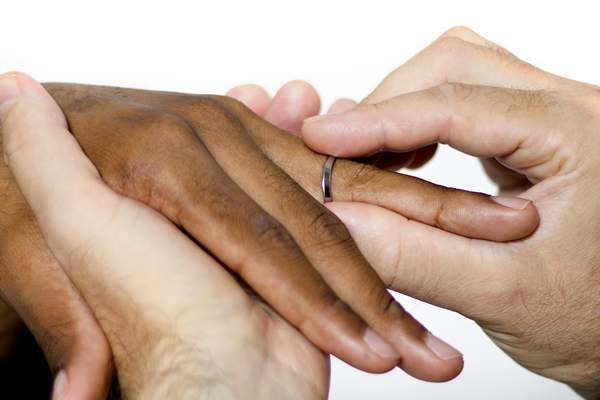a&e features
13 destination weddings that will surprise your guests
From roller coasters to Southfork, a range of new venues in holdout states
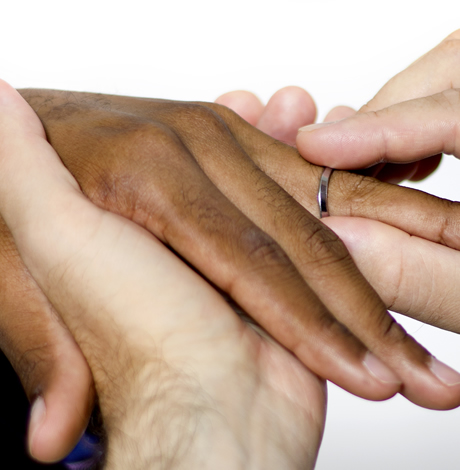
With last week’s Supreme Court ruling in Obergefell v. Hodges, same-sex couples suddenly have a lot of new options for destination weddings.
Before June 26, there were 13 states that did not allow gays to wed. We looked at off-the-beaten-path venues in each of those states you might want to consider if you want to walk down the aisle in a memorable way.
NEBRASKA
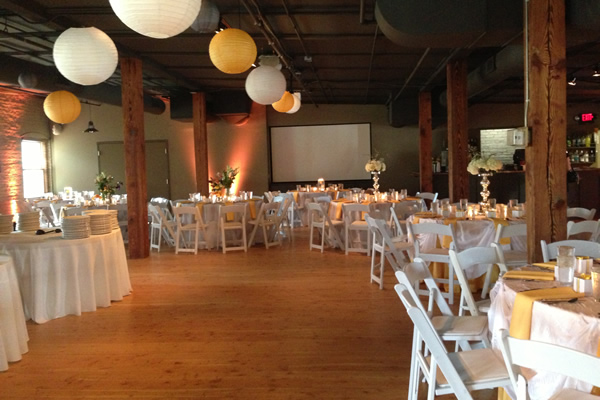
Old Mattress Factory Bar and Grill (Photo by Cyndi Murphy)
The Old Mattress Factory Bar & Grill — “The Matt” to locals — claims it’s North Downtown Omaha’s “best event bar” located in one of the area’s oldest historic buildings, an 1883 beautiful brick building that started as the Stabrie Grocery Store but later became the Central Mattress Company where, from 1945 into the 1990s, mattresses were built, sold and shipped.
“Matt” owners have taken pride in preserving its interiors and the site offers a newly renovated bar/restaurant within the original brick walls and architecture of the old Stabrie building. The unusually high ceilings and restored wood timbers and beams give the place an open and authentic atmosphere.
Although only about 15 weddings have been conducted there in Cyndi Murphy’s seven years there, it’s a popular spot for receptions.
“Oh, we do a ton,” Murphy says. “At least one reception a week.”
She says the Matt has already hosted several same-sex receptions and the staff would be delighted to do more.
“Absolutely,” she says. “We don’t discriminate against anybody. If you’re in love, have at it.”
Details at themattomaha.com.
NORTH DAKOTA
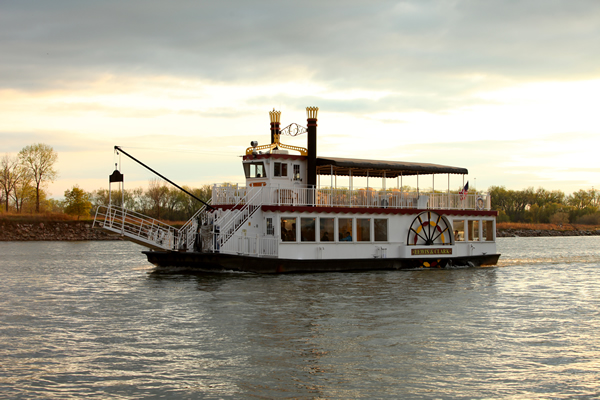
Lewis & Clark Riverboat (Photo by Jesse Knudson Photography)
Sail away to your new life together on the Lewis & Clark Riverboat, owned and operated by the Fort Abraham Lincoln Foundation. The riverboat is available May through September to enjoy the scenic Missouri River.
You and 100 guests can enjoy a ceremony held on the upper deck, wedding decor, a pre-event rehearsal, cash bar and staff. A variety of catering and reception options are available. Rates vary depending on day and length of event but start at $1,100.
Although they’ve had no same-sex weddings yet, Eryn Anderson, who works in the ticket office, says “of course” they’re open to that.
“We were just going to do a Pride event a couple weeks ago but it got cancelled because of weather,” she says. “But we have weddings here all the time and are definitely open to that.”
Details at lewisandclarkriverboat.com.
SOUTH DAKOTA

Mount Rushmore (Photo by Mike Tigas; courtesy Wikimedia Commons)
Billed as the “first ever wedding under the faces of Mount Rushmore,” a group wedding this fall will be gay. On Sept. 6, a “National Marriage Celebration” is planned for LGBT couples and allies where couples can wed or rededicate their vows. Officiants will perform the ceremony and sign marriage certificates. “Come solemnize or rededicate your vows at the historic event at the Shrine of Democracy,” organizers say. “Dinner and reception will be held in Rapid City after the ceremony.”
The event is being organized by the Black Hills Center for Equality, a Rapid City, S.D.-based LGBT group. Details at bhcfe.org.
TEXAS
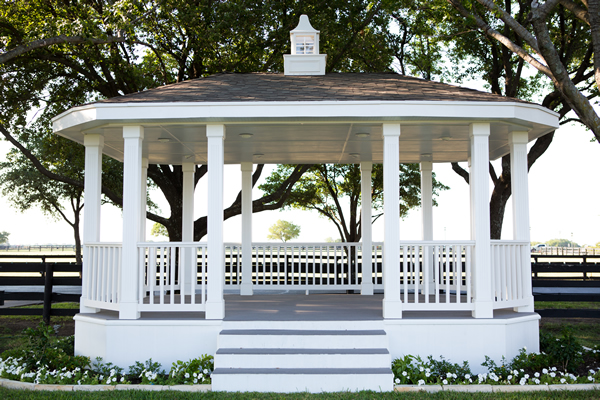
Southfork (Photo courtesy Cherie Calloway Photography)
If you want a big Texas wedding Ewing style, Southfork Ranch is happy to welcome you. Get married in style at the site of such famous “Dallas” weddings as Mitch and Lucy, J.R. and Sue Ellen (twice) and even Miss Ellie and Clayton. Lucy’s wedding dress is displayed on site along with other props from the classic soap (1978-1991 and 2012-2014).
“Southfork Ranch LLC allows same-sex and opposite-sex marriages as well as all denominations and cultures to marry here,” says Janna Timm, regional director of sales and marketing for the ranch. Same-sex couples have already wed there. The busy site averages about 75 weddings a year.
The Southfork Ranch Conference & Event Center in Parker, Texas (20 miles north of downtown Dallas) has 10 different ballrooms to host events of all sizes. Two full-time event professionals are on hand to help you with all details. No prices listed. Details at southfork.com
In a Blade interview last year, actress Linda Gray (Sue Ellen) said she would love to see a gay Southfork wedding.
“Sure, why not?,” she said.
OHIO
Several wedding packages are available at Cedar Point in Sandusky, Ohio, a 365-acre amusement park located on a Lake Erie peninsula in Sandusky, Ohio. Opened in 1870, it’s the second-oldest operating amusement park in the United States.
The most memorable would undoubtedly be the “Roller Coaster Wedding Package,” which can be yours for $4,500. Billed as “the ultimate way to tie the knot,” you can be joined in holy matrimony on the roller coaster platform of your choice for one hour before the park opens. Then take the plunge with private ride time for you and your guests.
The package includes one hour of private time on the ride, photos for 12 guests, a 90-minute escorted photo session in the park and park admission for 12 guests.
Details at cedarpoint.com.
TENNESSEE
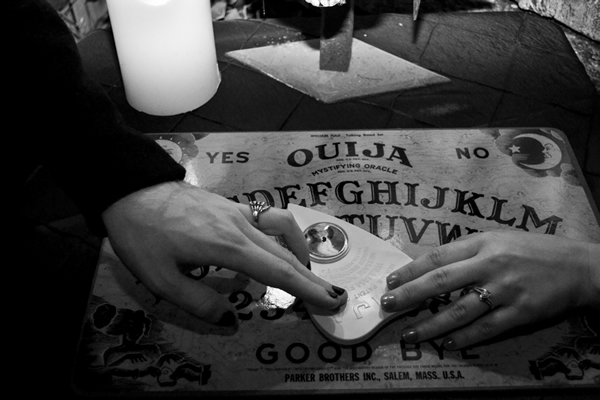
(Photo courtesy Racheal Melodie’s Photography)
Want to give your wedding a macabre twist? Look no further than the Death Yard Haunted Attraction in Nashville, which lets you get married in a haunted house with all the ghosts, ghouls, goblins and more.
“Dark Weddings” offer a “languished, Victorian-style parlor” and courtyard for your ceremony that can be held inside or out. Several packages are available. “The Tell-Tale Heart” is a 30-minute event for the couple and officiant only (no guests) that runs $400 (Mondays-Thursdays) or $475 on weekends.
“A Nightmare Come True” is one hour and allows for the couple and six guests and is $850 (weekdays) or $995 (weekends). Other packages vary and include “Till Death Do Us Part” (two hours), “The Midnight Hour Ceremony” (two-and-a-half hours) or “Piece by Piece,” which can be as long as you want.
“Our venue is open to every marriage,” said Ana Miller, Death Yard Haunted Attraction events coordinator. “We believe that everyone deserves love. Love always wins.”
Details at darkweddings.com.
ARKANSAS
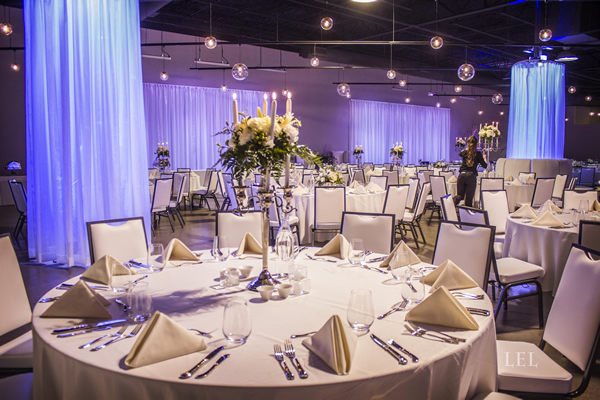
MovieLounge (Photo courtesy MovieLounge)
Cinema buff couples rejoice! MovieLounge (7601 Rogers Ave., Fort Smith, Ark.) is a mixture of traditional wedding hall and movie theater. The venue, owned by Dwight Curry (who’s gay), includes a main dining room, two cinemas and a ballroom space. Couples can even screen movies or photo galleries for their receptions if they choose.
MovieLounge has been serving the gay community in their wedding needs since its opening. “We had one phone call from a couple who had booked a commitment ceremony at another venue in town,” Curry says. “The owner found out it was a gay couple and told them they wouldn’t do it. They called us last minute and we were like absolutely. I’m really proud to be doing that kind of thing for Fort Smith.”
For more details, visit movieloungefsm.com.
GEORGIA
Tybee Wedding Chapel (1114 US-80, Tybee Island, Ga.) on Tybee Island is a tropical getaway wedding for those that want to stay stateside. Tybee Wedding Chapel accommodates different types of wedding ceremonies and receptions including taking private elopements with only one day’s notice.
The ceremony, reception, cocktail hour or after party can all be handled in the same space. For more information, visit tybeeweddingchapel.com.
KENTUCKY
Churchill Downs (700 Central Ave., Louisville, Ky.) is an interesting reception location for after the vows have been exchanged.
Churchill Downs, site of the annual Kentucky Derby, has a variety of rooms to rent that vary by number of people that need to be accommodated and by views. The Stakes Room has a view of the entire track while the Triple Crown Room holds views of the downtown skyline.
For more details, visit churchilldowns.com.
LOUISIANA
House of Blues New Orleans (225 Decatur St., New Orleans, La.) is an offbeat venue for a music-loving couple. Located in the heart of the French Quarter, there is both an outdoor and indoor space available to host a reception.
Renting options range from booking the restaurant for a sit down lunch to booking the entire music hall to watch your favorite local band, DJ or even headlining artist give a special performance for the memorable day.
For more details, visit houseofblues.com/neworleans.
MICHIGAN
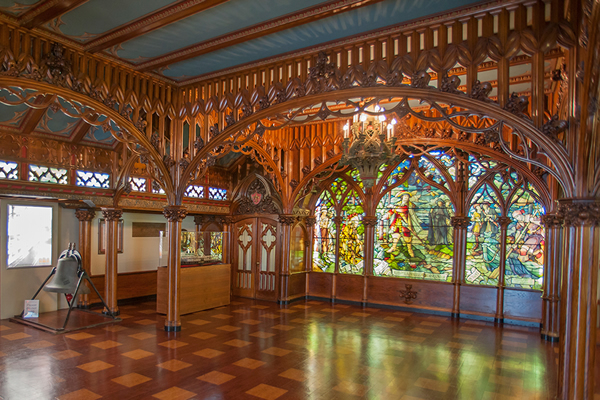
The Gothic Room (Photo courtesy Dossin Great Lakes Museum)
The Dossin Great Lakes Museum, part of the Detroit Historical Society, (100 The Strand, Detroit, Mich.) is the ideal venue for a maritime-themed wedding ceremony. The museum boasts scenic views of the Detroit River and Canada inside the Gothic Room, which seats 40.
Couples can rent out single rooms from the Gothic Room to DeRoy Hall, which seats 120 people. They can also rent the entire museum for their special day. For more information, visit detroithistorical.org/dossin-great-lakes-museum.
MISSISSIPPI
Mississippi Agricultural Museum (1150 Lakeland Dr., Jackson, Miss.) gives a wedding a historical small town feel for an intimate wedding gathering.
The Museum Church, a small historic church that seats 100, is where the wedding ceremony takes place, followed by a reception at the Masonic Lodge. The couple and their guests can walk through “Small Town” on their way to the chapel as well as shop at the General Store.
Details at mdac.ms.gov.
MISSOURI
Getting married in a barn has never been so glamorous. Give your wedding plenty of Southern charm by getting married at Dodson Orchards (Madison 9563 Fredericktown, Mo.).
Take all of the typical wedding factors and enjoy them inside Dodson Orchards’ rustic barn. There are even hayrides available for the couple and their guests to have a true country wedding experience.
For details, visit dodsonorchards.com.
a&e features
Meet D.C.’s Most Eligible Queer Singles
Our annual report, just in time for Valentine’s Day

Just in time for Valentine’s Day, the Blade is happy to present our annual Most Eligible Singles issue. The Singles were chosen by you, our readers, in an online nominations process.
John Marsh

Age: 35
Occupation: DJ and Drag Entertainer
How do you identify? Male
What are you looking for in a mate? I’m looking for someone who’s ready to dive into life’s adventures with me. someone independent and building their own successes, but equally open to supporting each other’s dreams along the way. I know that probably sounds simple because, honestly, who isn’t looking for that? But my life and career keep me very social and busy, so it’s important to me to build trust with someone who understands that. I want a partner who knows that even when life gets hectic or I’m getting a lot of attention through my work in the community, it doesn’t take away from my desire to build something real, intentional, and meaningful with the right person.
Biggest turn off: My biggest turnoff is arrogance or judgment toward others. I’m most drawn to people who are comfortable being themselves and who treat everyone with the same level of respect and care. I’ve worked hard for the success I’ve found, but I believe in staying humble and leading with kindness, and I’m attracted to people who live the same way. I’m also turned off by exclusionary mindsets, especially the idea that sapphic folks don’t belong in gay spaces. Our community is vibrant, diverse, and strongest when it’s shared with everyone who shows up with respect and love
Biggest turn on: I’m drawn to people who can confidently walk into new spaces and create connection. Being able to read a room and make others feel comfortable shows emotional intelligence and empathy, which I find incredibly attractive. I also come from a very social, open, and welcoming family environment, so being with someone who embraces community and enjoys bringing people together is really important to me.
Hobbies: I have a lot of hobbies and love staying creative and curious. I’m a great cook, so you’ll never have to worry about going hungry around me. In my downtime, I watch a lot of anime and I will absolutely talk your ear off about my favorites if you let me. I’m also a huge music fan and K-pop lover (listen to XG!), and I’m a musician who plays the cello. I spend a lot of time sewing as well, which is a big part of my creative expression. My hobbies can be a little all over the place, but I just genuinely love learning new skills and trying new things whenever I can.
What is your biggest goal for 2026? This year feels like a huge milestone for me. I’m getting ready to join a tour this summer and want to represent myself well while building meaningful connections in every city I perform in. I’m also focused on growing as a DJ, sharing more mixes and content online, and reaching a big creative goal of releasing original music that I’m producing.
Pets, Kids or Neither? I have a lovely Akita named Grady that I’ve had for 10 years and always want pets in my life. I’m open to kids when/if the time is right with the right person.
Would you date someone whose political views differ from yours? Hell no. I don’t see political differences as just policy disagreements anymore – they often reflect deeper values about how we treat people and support our communities. I’m very progressive in my beliefs, and I’m looking for a partner who shares that mindset. For me, alignment in values like equity, compassion, and social responsibility is non-negotiable in a relationship. To be very clear about my beliefs, I’m outspoken about my opposition to immigration enforcement systems like ICE and believe both political parties have contributed to policies that have caused real harm to vulnerable communities. I’m also deeply disturbed by the ongoing violence in Palestine and believe we need to seriously examine our support of military actions that have resulted in the loss of countless innocent lives. These aren’t abstract political opinions for me, they are moral issues that directly inform who I am and what I stand for.
Celebrity crush: Cocona
Name one obscure fact about yourself: I used to own a catering business in college that paid for my school — I also went to a Christian college, lol.
Jackie Zais

Age: 35
Occupation: Senior director at nonprofit
How do you identify? Lesbian woman
What are you looking for in a mate? Looking for someone who’s curious about the world and the people in it — the kind of person who’s down to explore a new spot one night and stay in with takeout the next. Confident in who they are, social without being exhausting, adventurous but grounded, thoughtful but not pretentious. Someone who can be funny while still taking life (and relationships) seriously.
Biggest turn off: Doesn’t have strong opinions. I love hearing a wild hot take.
Biggest turn on: When someone can make me belly laugh.
Hobbies: Number one will always be yapping with friends over food, but I also love collecting new hobbies. Currently, I crochet (and have some dapper sweater vests as a result), listen to audiobooks on what I personally think is a normal speed (2x) and play soccer and pickleball. But I’ve tried embroidery, papier-mâché, collaging, collecting plants, scrap booking, and mosaic.
What is your biggest goal for 2026? I’ve recently started swimming and I want to look less like a flailing fish and more like someone who knows what they’re doing.
Pets, Kids or Neither? I have neither but open to kids
Would you date someone whose political views differ from yours? My best friend is a moderate Democrat and that’s as far right as I’m willing to go.
Celebrity crush: Tobin Heath
Name one obscure fact about yourself: I’m the daughter of Little Miss North Quincy 1967.
Kevin Schultz

Age: 39
Occupation: Product manager
How do you identify? Gay
What are you looking for in a mate? You know 2001’s hottest Janet Jackson single, “Someone to Call My Lover?” To quote Janet, “Maybe, we’ll meet at a bar, He’ll drive a funky car; Maybe, we’ll meet at a club, And fall so deeply in love.”
Realistically though, I’d love to find someone who loves to walk everywhere and who avoids the club because it’s too loud and crowded. Later in the song, our songstress opines “My, my, looking for a guy, guy, I don’t want him too shy; But he’s gotta have the qualities, That I like in a man: Strong, smart, affectionate” and I’m quite aligned there – I’m an introvert looking for someone more extroverted.
I’m looking for someone who is different from me. When the math works, one plus one should equal two. Two becoming one is more art, and my relational approach is more science, or, I guess, math.
Biggest turn off: I’m turned off by a lot of superficially small things — chewing with one’s mouth open, dirty or untrimmed fingernails, oh, and also, lack of self awareness. My personal brand of anxiety is hyper self-aware, so I’m very turned off by someone who doesn’t realize that they exist in the world with others.
Biggest turn on: Competency. Or maybe…eyes? So perhaps, you see my conundrum — I’m very engaged by people who are deeply engaged by something, but I’d be lying if I said a sharp gaze and a wink didn’t get me. And, you know, some stamina in all avenues, mental and physical doesn’t hurt either.
Hobbies: Fixing everyone’s WiFi (this did actually get me a date once), and just generally fixing everyone’s everything. If it’s got a plug, screen, or buttons I can probably help you with it. On my own, I’m really into smart home devices and automation, and just to be timely, my latest thing is setting up and tuning my own instance of OpenClaw. (No one should actually do this, which is why I’m trying.) Together, we could also explore such hobbies as visiting every Metro station, visiting and exploring a new airport, and exploring why there are so many gay transit nerds. There’s no non-fake sounding way to say this but I also just love knowledge seeking, so I’d also love to go on an adventure with you where we learn something brand new.
What is your biggest goal for 2026? My biggest goal is to arrive to 2027 just a little better than I arrived to 2026. A few gym goals, a few personal goals, a few work goals; I hope to get a few of them across the finish line. At the risk of holding myself accountable, one of those goals is to be able to flawlessly side plank for over a minute. Please don’t mistake me for a huge gym rat; I just have a questionable relationship with balance and I’m really working on it.
Pets, Kids or Neither? I’ll just be blunt: no pets. Stating this on my Hinge profile resulted in an exponential loss of matches, so it’s very fun to trot out the idea. Primarily, I’m allergic to cats and dogs so my aversion is mostly biological. I’m not, however, allergic to kids — big fan of my various nieces and nephews — but I’d really only consider kids of my own if my chosen companion and I could financially afford them without compromise, and at this age I’ve become opinionated about the life I want to live.
Would you date someone whose political views differ from yours? No. This becomes a simpler answer with each passing day, unfortunately.
Celebrity crush: If I’m being of the moment, of course, it’s going to be one of the gentlemen on “Heated Rivalry,” but if I were to really dig into the archives it would be pre-Star Trek Chris Pine. I first saw him in an absolute train wreck of a movie called “Blind Dating” where he plays a blind guy who tries to pretend to be sighted in order to date. The movie was terrible, but I found him irresistible.
Name one obscure fact about yourself: I went suddenly deaf on one side only (my left) just before my 33rd birthday. After a bit of time in the wilderness (metaphorically) I got a cochlear implant a few years later, and it really changed my life. I will talk until someone stops me about hearing, sound, and the amazing arena of hearing loss technology. A lot of people, when they see my implant, assume I was born with hearing loss, so it’s always a bit odd (obscure even!) when I tell people I lost it as an adult. But, I also got my hearing back as an adult and am an eager advocate for assistive technology and visibility for people with disabilities that are not always immediately visible. I also work with prospective adult implant candidates to determine if an implant is right for them, because losing hearing suddenly as an adult is isolating and it’s helpful to talk to someone who’s been there.
Gabriel Acevero

Age: 35
Occupation: Maryland State Delegate
How do you identify? Gay
What are you looking for in a mate? Emotional intelligence and a sense of humor.
Biggest turn off: Fetishization.
Biggest turn on: Kindness and emotional intelligence.
Hobbies: Traveling and reading (I love books).
What is your biggest goal for 2026? More self care. I love what I do but it can also be physically taxing. In 2026, I’m prioritizing more self care.
Pets, Kids or Neither? I have neither but I’m open to both.
Would you date someone whose political views differ from yours? No.
Celebrity crush: Kofi Siriboe
Name one obscure fact about yourself: I’m a Scorpio who was raised by a Scorpio and I have many Scorpios in my life.
Vida Rangel

Age: 36
Occupation: Public Servant, Community Organizer
How do you identify? I am a queer transLatina
What are you looking for in a mate? I’m looking for a partner who is caring, socially aware, and passionate about meaningfully improving some part of this world we all live in. Ideally someone playful who can match my mischievous energy, will sing and dance with me whenever joy finds us, and will meet me at protests and community meetings when the moment calls for bold collective action.
Biggest turn off: Ego. Confidence can be cute, but humility is sexy.
Biggest turn on: Drive. Seeing someone put their heart into pursuing their goals is captivating. Let’s chase our dreams together!
Hobbies: Music in all its forms (karaoke, playing guitar, concerts, musicals…), finding reasons to travel to new places, and making (Mexican) tamales for friends and coworkers.
What is your biggest goal for 2026? My biggest goal for 2026 is to organize and a celebratory kiss on election night wouldn’t hurt.
Pets, Kids or Neither? An adorable black cat named Rio (short for Misterio)
Would you date someone whose political views differ from yours? Ma’am? If you feel the need to ask…
Celebrity crush: Mi amor, Benito Bad Bunny. Zohran Mamdani, too. I have lots of love to give.
Name one obscure fact about yourself: I worked at Chick-fil-A when I was in high school and was fired after just three months. At the time it was still legal to fire someone for being trans, but I’m pretty sure it was because I called out to go to a Halloween party.
Em Moses

Age: 34
Occupation: Publishing
How do you identify? Queer
What are you looking for in a mate? Companionship, passion, fun. I seek a confident partner who inspires me, someone to laugh and dance with, someone with a rich internal universe of interests and experiences to build upon. A lifelong friend.
Biggest turn off: Dishonesty.
Biggest turn on: I love when someone is exactly themselves, nurturing their passions and skills and showing up uniquely in this world as only they can.
Hobbies: I love to read. I create art with my hands. When the weather is nice I’m outside, walking around the District looking at flowers and trees.
What is your biggest goal for 2026? My main goal this year is to spend more time with my nieces and nephews.
Pets, Kids or Neither? No pets or children in my life currently.
Would you date someone whose political views differ from yours? While I consider myself quite openminded and genuinely enjoy learning from perspectives different from my own, I have clear boundaries around my morals and those pillars do not fall.
Celebrity crush: Luigi Mangione
Name one obscure fact about yourself: My first job was at a donut shop.
Nate Wong

Age: 41
Occupation: Strategy adviser to nonprofits and philanthropists to help ambitious ideas turn into meaningful, positive societal impact.
How do you identify? Gay (he/him)
What are you looking for in a mate? An additive partner: sociable, adventurous, and curious about the world. I’m drawn to warmth, openness, and people who show up fully — one-on-one and in community. If you enjoy a good dinner party, make eye contact, and actually talk to strangers (I know a D.C. no-no), we’ll get along just fine.
Biggest turn off: Not being present. Active listening matters to me; attention is a form of respect (and honestly, very attractive). And a picky food eater (how will we some day be joint food-critics?).
Biggest turn on: Curiosity, adventuresome spirit, and someone who can hold their own in a room — and still make others feel at ease. Confidence is best when it’s generous.
Hobbies: Splitting my time between the ceramics studio (District Clay), planning the next trip, and finding great food spots. I box to balance it all out, and I love curating small, adventurous gatherings that bring interesting people together — the kind where you stay later than planned.
What is your biggest goal for 2026? The last few years threw some curve balls. So 2026 is all about moving forward more freely and passionately, trusting what feels right and following it with intention (and joy).
Pets, Kids or Neither? Open to kids (in a variety of forms — already have some adorable god kids). A hypoallergenic dog would absolutely raise the cuddle quotient; cats are best admired from a respectful, allergy-safe distance.
Would you date someone whose political views differ from yours? I value thoughtful listening and sincere debate; shared values around the honoring of everyone’s humanity, equity, and justice matter to me and aren’t up for debate.
Celebrity crush: Bad Bunny style with Jason Momoa humble confidence (harking to my Hawaiian roots) and Idris Elba charm — range matters.
Name one obscure fact about yourself: I celebrated medical clearance by going surfing in El Salvador. I’ve also nearly been arrested in Mozambique and somehow walked away unscathed (and without complying with a bribe) — happy to explain over an excursion.
Diane D’Costa

Age: 29
Occupation: Artist + Designer
How do you identify? Queer/lesbian
What are you looking for in a mate? A cuddle buddy, a fellow jet setter, a muse! Someone to light my soul on fire (in a good way).
Biggest turn off: Apathy. I care deeply about a lot of things and need someone with a similar curiosity and zest for life.
Biggest turn on: Mutuality really does it for me — a push and pull, someone who will throw it back and also catch it. I love someone who takes initiative, shows care and compassion, and expresses fluidity and confidence.
Hobbies: You can find me throwing pottery, painting, sipping natural wine, supporting local coffee shops, and most definitely tearing up a QTBIPOC dance floor.
What is your biggest goal for 2026? Producing my first solo art show. This year I’m really leaning into actualizing all my visions and dreams and putting them out into the world.
Pets, Kids or Neither? I’ve got a Black Lab named Lennox after the one and only D.C. icon, Ari Lennox. I love supporting the youth and (made a career out of it), but don’t necessarily need to have little ones of my own.
Would you date someone whose political views differ from yours? No. Values alignment is key, but if you wanna get into the nuances of how we actualize collective liberation let’s get into it.
Celebrity crush: Queen Latifah
Name one obscure fact about yourself: I’m in the “Renaissance” movie. I know, I know slight flex… but “Crazy In Love” bottom left corner for a split second and a harsh crop, but I’m in there. “You are the visuals, baby” really hit home for me.
Donna Marie Alexander

Age: 67
Occupation: Social Worker
How do you identify? Lesbian
What are you looking for in a mate? Looking for a smart, kind, emotionally grown woman who knows who she is and is ready for real companionship. Also, great discernment and a good lesbian processor. Bonus points if you’ll watch a game with me— or at least cheer when I do. Extra bonus if you already know that women’s sports matter.
Ideal first date: Out for tea or a Lemon Drop that turns into dinner, great conversation, and a few laughs. Low drama, high warmth.
Must haves: A sense of humor, curiosity about the self, curiosity about me, and curiosity about the world. An independence, and an appreciation for loyalty—on and off the field. Dealbreaker: Anyone who thinks “it’s just a game.”
Biggest turn off: Self-centered and a lack of discernment.
Biggest turn on: Great conversation and a sense of humor.
Hobbies: Watching the Commanders game
What is your biggest goal for 2026? Self-growth and meeting an amazing friend.
Pets, Kids or Neither? I have two kids and grandkids.
Would you date someone whose political views differ from yours? No
Celebrity crush: Pam Grier
Name one obscure fact about yourself: She’s way more superstitious about game-day routines than she lets on
Joe Reberkenny

Age: 24
Occupation: Journalist
How do you identify? Gay
What are you looking for in a mate? Someone who’s driven, flexible, and independent. I’m a full-time journalist so if there’s news happening, I’ve gotta be ready to cover breaking stories. I’m looking for someone who also has drive in their respective career and is always looking to the future. I need someone who gets along with my friends. My friends and community here are so important to me and I’m looking for someone who can join me in my adventures and enjoys social situations.
Biggest turn off: Insecurity and cocky men. Guys who can’t kiki with the girls. Early bedtimes.
Biggest turn on: Traits: Emotional stability and reliability. A certain sense of safety and trust. Someone organized and open to trying new things. Physical: Taller than I am (not hard to do at 5’7″) but also a preference for hairy men (lol). Someone who can cook (I am a vegetarian/occasional pescatarian and while it’s not a requirement for me in a partner it would need to be something they can accommodate).
Hobbies: Exploring D.C. — from museums to nightlife, reading (particularly interested in queer history), dancing, frolicking, playing bartender, listening to music (preferably pop), classic movie connoisseur (TCM all the way).
What is your biggest goal for 2026? Continue my work covering LGBTQ issues related to the federal government, uplift queer voices, see mother monster (Lady Gaga) in concert.
Pets, Kids or Neither? I’ve got neither but I love a pet.
Would you date someone whose political views differ from yours? No
Celebrity crush: Pedro Pascal
Name one obscure fact about yourself: I’ve been hit by multiple cars and I have a twin sister.
a&e features
Marc Shaiman reflects on musical success stories
In new memoir, Broadway composer talks ‘Fidler,’ ‘Wiz,’ and stalking Bette Midler

If you haven’t heard the name Marc Shaiman, you’ve most likely heard his music or lyrics in one of your favorite Broadway shows or movies released in the past 50 years. From composing the Broadway scores for Hairspray and Catch Me if You Can to most recently working on Only Murders in the Building, Hocus Pocus 2, and Mary Poppins Returns, the openly queer artist has had a versatile career — one that keeps him just an Oscar away from EGOT status.
The one thing the award-winning composer, lyricist, and writer credits with launching his successful career? Showing up, time and time again. Eventually, he lucked out in finding himself at the right place at the right time, meeting industry figures like Rob Reiner, Billy Crystal, and Bette Midler, who were immediately impressed with his musical instincts on the piano.
“Put my picture under the dictionary definition for being in the right place at the right time,” Shaiman says. “What I often try to say to students is, ‘Show up. Say yes to everything.’ Because you never know who is in the back of the theater that you had no idea was going to be there. Or even when you audition and don’t get the part. My book is an endless example of dreams coming true, and a lot of these came true just because I showed up. I raised my hand. I had the chutzpah!”
Recalling one example from his memoir, titled Never Mind the Happy: Showbiz Stories from a Sore Winner ( just hit bookshelves on Jan. 27), Shaiman says he heard Midler was only hiring Los Angeles-based artists for her world tour. At the young age of 20, the New York-based Shaiman took a chance and bought the cheapest flight he could find from JFK. Once landing in L.A., he called up Midler and simply asked: “Where’s rehearsal?”
“Would I do that nowadays? I don’t know,” Shaiman admits. “But when you’re young and you’re fearless … I was just obsessed, I guess you could say. Maybe I was a stalker! Luckily, I was a stalker who had the goods to be able to co-create with her and live up to my wanting to be around.”
On the occasion of Never Mind the Happy’s official release, the Bladehad the opportunity to chat with Shaiman about his decades-spanning career. He recalls the sexual freedom of his community theater days, the first time he heard someone gleefully yell profanities during a late screening of The Rocky Horror Picture Show, and why the late Rob Reiner was instrumental to both his career and his lasting marriage to Louis Mirabal. This interview has been edited and condensed.
BLADE: Naturally, a good place to start would be your book, “Never Mind the Happy.” What prompted you to want to tell the story of your life at this point in your career?
SHAIMAN: I had a couple of years where, if there was an anniversary of a movie or a Broadway show I co-created, I’d write about it online. People were always saying to me, “Oh my God, you should write a book!” But I see them say that to everybody. Someone says, “Oh, today my kitten knocked over the tea kettle.” “You should write a book with these hysterical stories.” So I just took it with a grain of salt when people would say that to me. But then I was listening to Julia Louis-Dreyfus’ podcast, and Jane Fonda was on talking about her memoir — not that I’m comparing myself to a career like Jane Fonda’s — but she felt it was time to take a life review. That really stuck in my head. At the time, I was sulking or moping about something that had not gone as well as I wished. And I guess I kind of thought, “Let me look back at all these things that I have done.” Because I have done a lot. I’m just weeks short of my 50th year in show business, despite how youthful I look! I just sat down and started writing before anyone asked, as far as an actual publisher.
I started writing as a way to try to remind myself of the joyous, wonderful things that have happened, and for me not to always be so caught up on what didn’t go right. I’ve been telling some of these stories over the years, and it was really fun to sit down and not just be at a dinner party telling a story. There’s something about the written word and really figuring out the best way to tell the story and how to get across a certain person’s voice. I really enjoyed the writing. It was the editing that was the hard part!
BLADE: You recall experiences that made you fall in love with the world of theater and music, from the days you would skip class to go see a show or work in regional productions. What was it like returning to those early memories?
SHAIMAN: Wonderful. My few years of doing community theater included productions that were all kids, and many productions with adults, where I was this freaky little 12-year-old who could play show business piano beyond my years. It was just bizarre! Every time a director would introduce me to another cast of adults, they’d be like, “Are you kidding?” I’d go to the piano, and I would sightread the overture to Funny Girl, and everybody said, “Oh, OK!” Those were just joyous, wonderful years, making the kind of friends that are literally still my friends. You’re discovering musical theatre, you’re discovering new friends who have the same likes and dreams, and discovering sex. Oh my god! I lost my virginity at the opening night of Jesus Christ Superstar, so I’m all for community theater!
BLADE: What do you recall from your early experiences watching Broadway shows? Did that open everything up for you?
SHAIMAN: I don’t remember seeing Fiddler on the Roof when I was a kid, but I remember being really enthralled with this one woman’s picture in the souvenir folio — the smile on her face as she’s looking up in the pictures or looking to her father for approval. I always remember zooming in on her and being fascinated by this woman’s face: turns out it was Bette Midler. So my love for Bette Midler began even before I heard her solo records.
Pippin and The Wiz were the first Broadway musicals I saw as a young teenager who had started working in community theater and really wanted to be a part of it. I still remember Pippin with Ben Vereen and all those hands. At the time, I thought getting a seat in the front row was really cool — I’ve learned since that it only hurts your neck, but I remember sitting in the front row at The Wiz as Stephanie Mills sang Home. Oh my god, I can still see it right now. And then I saw Bette Midler in concert, finally, after idolizing her and being a crazed fan who did nothing but listen to her records, dreaming that someday I’d get to play for her. And it all came true even before I turned 18 years old. I just happened to be in the right place at the right time, and met one of her backup singers and became their musical director. I was brought to a Bette Midler rehearsal. I still hadn’t even turned 18, she heard me play and said, “Stick around.” And I’ve stuck around close to 55 years! She’s going to interview me in L.A. at the Academy Museum. Would I have ever thought that Bette Midler would say yes to sitting with me, interviewing me about my life and career?
BLADE: That’s amazing. Has she had a chance to read the book yet?
SHAIMAN: She read it. We just talked yesterday, and she wants to ask the right questions at the event. And she even said to me, “Marc, I wasn’t even aware of all that you’ve done.” We’ve been great friends for all these years, but sometimes months or almost years go by where you’re not completely in touch.
a&e features
D.C. LGBTQ sports bar Pitchers listed for sale
Move follows months of challenges for local businesses in wake of Trump actions
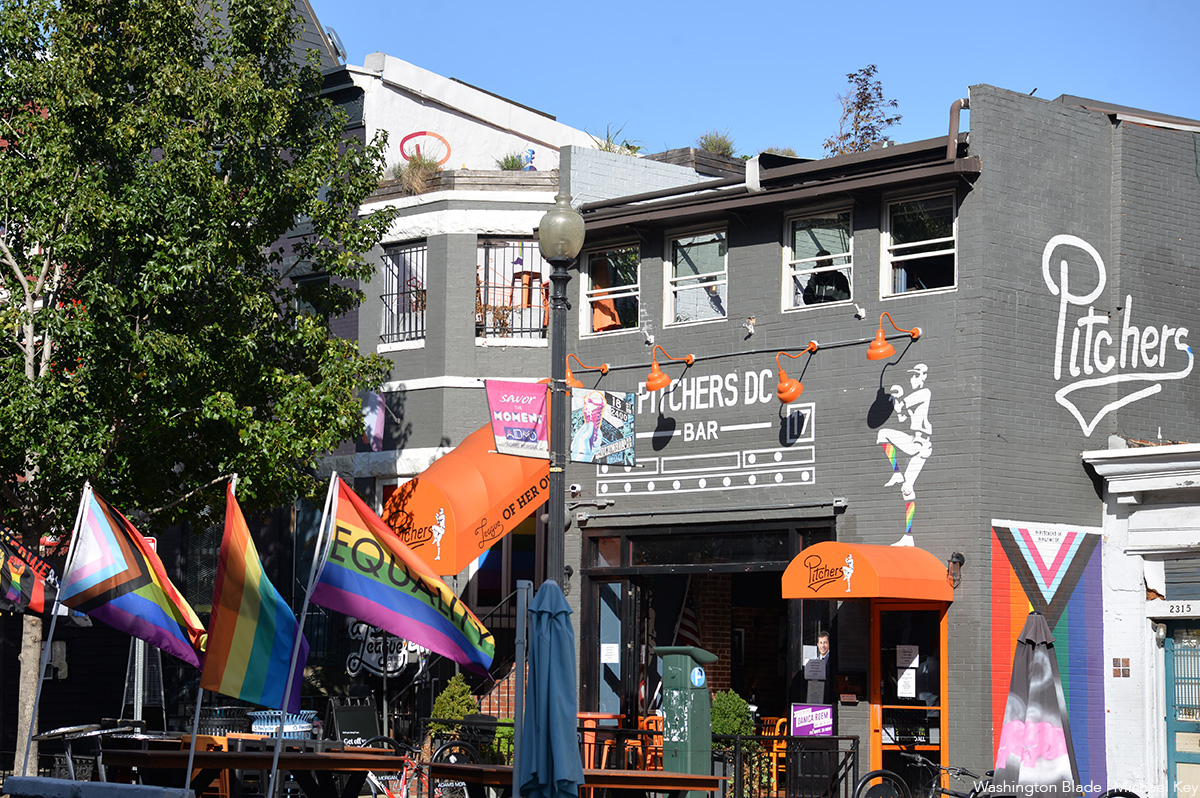
A Santa Monica, Calif.-based commercial real estate company called Zacuto Group has released a 20-page online brochure announcing the sale of the D.C. LGBTQ sports bar Pitchers and its adjoining lesbian bar A League of Her Own.
The brochure does not disclose the sale price, and Pitchers owner David Perruzza told the Washington Blade he prefers to hold off on talking about his plans to sell the business at this time.
He said the sale price will be disclosed to “those who are interested.”
“Matthew Luchs and Matt Ambrose of the Zacuto Group have been selected to exclusively market for sale Pitchers D.C., located at 2317 18th Street, NW in Washington, D.C located in the vibrant and nightlife Adams Morgan neighborhood,” the sales brochure states.
“Since opening its doors in 2018, Pitchers has quickly become the largest and most prominent LGBTQ+ bar in Washington, D.C., serving as a cornerstone of D.C.’s modern queer nightlife scene,” it says, adding, “The 10,000+ SF building designed as a large-scale inclusive LGBTQ+ sports bar and social hub, offering a welcoming environment for the entire community.”
It points out that the Pitchers building, which has two years remaining on its lease and has a five-year renewal option, is a multi-level venue that features five bar areas, “indoor and outdoor seating, and multiple patios, creating a dynamic and flexible layout that supports a wide range of events and high customer volume.”
“Pitchers D.C. is also home to A League of Her Own, the only dedicated lesbian bar in Washington, D.C., further strengthening its role as a vital and inclusive community space at a time when such venues are increasingly rare nationwide,” the brochure says.
Zacuto Group sales agent Luchs, who serves as the company’s senior vice president, did not immediately respond to a phone message left by the Blade seeking further information, including the sale price.
News of Perruzza’s decision to sell Pitchers and A League of Her Own follows his Facebook postings last fall saying Pitchers, like other bars in D.C., was adversely impacted by the Trump administration’s deployment of National Guard soldiers on D.C. streets
In an Oct. 10 Facebook post, Perruzza said he was facing, “probably the worst economy I have seen in a while and everyone in D.C. is dealing with the Trump drama.” He told the Blade in a Nov. 10 interview that Pitchers continued to draw a large customer base, but patrons were not spending as much on drinks.
The Zacuto Group sales brochure says Pitchers currently provides a “rare combination of scale, multiple bars, inclusivity, and established reputation that provides a unique investment opportunity for any buyer seeking a long-term asset with a loyal and consistent customer base,” suggesting that, similar to other D.C. LGBTQ bars, business has returned to normal with less impact from the Trump related issues.
The sales brochure can be accessed here.
-

 Health5 days ago
Health5 days agoCMS moves to expand HIV-positive organ transplants
-

 State Department4 days ago
State Department4 days agoFOIA lawsuit filed against State Department for PEPFAR records
-

 Opinions4 days ago
Opinions4 days agoTrans sports bans rooted in eugenics
-

 India4 days ago
India4 days agoTrans students not included in new India University Grants Commission equity rules

